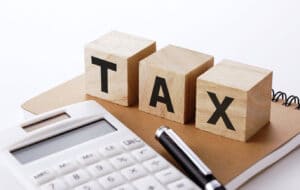
How To File a Collection Appeal to Stop the IRS
Understanding the process for how to file a collection appeal to stop the IRS may prove essential in protecting your rights and interests. Nonpayment of taxes for any reason can result in legal actions to collect the amount owed to the Internal Revenue Service through enforced collection methods. This process can be delayed or avoided by following the proper procedure in the notices, or by filing an appeal to get the amount reviewed.

Last year, over 57% of American households owed money to the IRS that became past due, which is also known as back taxes. Some of these taxes have gone unpaid as the filer does not believe that the amount shown is not the correct amount owed. In such cases, filers might need to seek legal help on how to file a collection appeal to stop the IRS from taking further collection actions against them.
How To File A Collection Appeal To Stop The IRS
Depending on what notice is received will determine how far into the process that the IRS is, and can determine what action they can take to collect the amount in question. An appeal would be handled through one of the IRS appeals programs that have been put into place to allow for the IRS and the taxpayer to work out disputes over taxes owed.
The form that will need to be filed will be determined by what noticed is received and needs to be filed within specified time frames to be valid. It is also important to understand what order the notices are sent, so you know what power the IRS has at the time of sending the notice.
The IRS is not able to enforce collection of the owed amount until all the proper notices and timeframes have passed for them to do so. Even after several notices, the IRS must still wait until a hearing has been held to be able to levy assets. If the receipt of the notices has not been able to appeal the process prior to the hearing, they can appear at this hearing to appeal the action.
If no action has been done for the hearing, then the IRS can take to enforce collections can include:
- Wage garnishments, that take a set percentage of wages until the amount if paid in full
- Bank garnishments, which can freeze and take funds from bank accounts owned by the debtor
- A lien on property also known as a tax lien which can effect selling these assets
Some of these processes can be stopped by writing out a proposed installment payment plan that the IRS might except for repaying back taxes. They can decline to accept the proposal if they wish, but it is an option that is available if accepted.
If it is declined, then the debtor has 30 days to start filing their CAP (Collection Appeal Process) after this installment agreement has been declined. The earlier into the process that the filer can begin the process can help them to successfully file a tax appeal, as it gives more time to get the situation sorted out prior to the hearing.
What Is a Collection Appeal?
A collection appeal is an opportunity to discuss options and amounts with an IRS officer to try to avoid enforced collections attempts. This can be done prior to the hearing that will be set after receiving notice 3598. If notices were received late and time is short to get the situation sorted out before the hearing then the receipt can call the number on the notice pay in full to avoid the hearing, and attempting to file a claim and get refunded at a later date after the matter can be reviewed.
If the amount needs to be discussed prior to payment due to the filer disputing the amount owed, then they can use the CAP (Collection Appeals Program) that is one of the two resources that a filer can file to dispute this process before or after it has started. The other is CDP (Collection Due Process) and it is good to know that if the appeal is filed under one program then it is usually excluded from being filed in the other program. It is important for the filer to pick the program that is going to do them the most good, as they will only have one chance to file this case correctly.
A lawyer can help any potential filer as a guide to the IRS appeals process and help them pick which program is the right choice for their situation.
The filer will need to disclose the specifics of the case and their financial situation, so the lawyer can advise on spent assets and reasonable collection potential, which is what the IRS believes they can collect for repayment of the amount owed by liquidating the debtor’s assets. Knowing these financial details will allow the lawyer to go over if an offer of compromise might be offered and accepted by the IRS.
An offer of compromise is an offered amount that the IRS will accept to deem the matter paid. If this is not a financial option, a lawyer will also be able to advise on the appeals process and help the filer know which program and form to fill out to get the process started.
One of the requirements for the filing process is to fill out a form that outlines why the filer disagrees with the action and the amount. This is best to be done on a separate sheet of paper attached to the form, as this gives the filer the most space to give a detailed reason for the dispute. Otherwise, the form has more basic information on it that includes personal and contact information for an employee to reach out about the case.
When Can You File a Collection Appeal?
The best time to file a collection appeal would be when receiving the first notice that the IRS sends the CP504. To get the process started for a review the receipt should call the number provided on the letter to speak to an IRS employee to dispute the amount, this should be followed up by filing the necessary documents.
By taking action as quickly as possible, the notice recipient can avoid hearings and possible additional fees that might be assessed during the enforcement process. If the taxpayer did not pay their taxes, then the notices they will get will be as follows:
- CP504 is the first notice that the IRS sends to let the tax filer know what money is owed and that is it past due and needs to be paid, or they will enforce collections
- Notice of Intent to Levy and Your Right to a hearing, notice 3598 informs the receipt of notice that continued non-payment will result in enforced collections
- One more notice prior to the IRS being able to levy/garnish is called letter 3172 and that is the Final Notice of Intent to Levy and Notice of Your Right to a Hearing. This would be the last opportunity for the taxpayer to appear and dispute the amount prior to enforced collections being able to be put into place
It is better to start the process of filing for an appeal upon receiving the CP504, but the recipient can still file an appeal upon receiving additional notices, as long as it is done in the proper time frame. Publication 1660 is a resource provided for taxpayers to be able to navigate the appeals process and to know what kind of documentation is needed for each notice.
However, this is a time-sensitive issue and needs to be dealt with as quickly as possible so that garnishments or liens are not put into place. Keep in mind that if the process does get to the point of having to file a petition with the appeals court, then an employee will reach out to talk about the case. To make sure that this is the correct entity and not a scam, it is good to know that the employee will provide their name, badge number and the case number that will have been provided.
The appeals process was created to hear out disagreements between the IRS and citizens. But it’s important to know that disagreements will not be heard on the basis of non-payment due to a moral or political disagreement. This is another reason why it might be good to retain a lawyer prior to the appeals. After outlining their case, a lawyer will be able to let them know if they have a case that the appeals program will heal. Once a decision has been made through this process, both the IRS and the filer will have to abide by the decision is made and pay the amount, if any, that is found to be owed.



